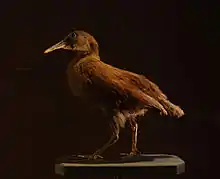New Caledonian rail
The New Caledonian rail (Cabalus lafresnayanus) is a large and drab flightless rail that is found on the island of New Caledonia in the Pacific. It is a dull brown above, with grey underparts, and has a yellowish, downward-curving bill. No one knows what it sounds like and it is not known whether it is nocturnal or crepuscular.
| New Caledonian rail | |
|---|---|
 | |
| Stuffed specimen] | |
| Scientific classification | |
| Kingdom: | Animalia |
| Phylum: | Chordata |
| Class: | Aves |
| Order: | Gruiformes |
| Family: | Rallidae |
| Genus: | Cabalus |
| Species: | C. lafresnayanus |
| Binomial name | |
| Cabalus lafresnayanus | |
It most likely was driven to extinction from predation by feral cats, dogs, and pigs.
Status

This cryptic rail is only known from seventeen specimens taken between 1860 and 1890 on New Caledonia. This bird is supposed to live in evergreen forests and seems to have moved higher up on the island to escape introduced predators. Its diet consists of invertebrates, including earthworms.
Though the bird has not been confirmed since 1890, unconfirmed reports from the 1960s and 1984 say that some still live in the higher montane forests. A survey in 1998 produced no firm evidence from hunters or fieldwork. However, many still believe it persists in small numbers.
This bird was host to a species of parasite, the phtilopterid louse Rallicola piageti. This is not believed to have occurred on any other bird species . Hence, R. piageti may be coextinct today (May 1990).
The binomial commemorates the French ornithologist Frederic de Lafresnaye.
References
- BirdLife International (2013). "Gallirallus lafresnayanus". IUCN Red List of Threatened Species. 2013. Retrieved 26 November 2013.CS1 maint: ref=harv (link)
- Mey, Eberhard (1990): Eine neue ausgestorbene Vogel-Ischnozere von Neuseeland, Huiacola extinctus (Insecta, Phthiraptera). Zoologischer Anzeiger 224(1/2): 49–73. [German with English abstract] PDF fulltext
External links
 Media related to Gallirallus lafresnayanus at Wikimedia Commons
Media related to Gallirallus lafresnayanus at Wikimedia Commons Data related to Gallirallus lafresnayanus at Wikispecies
Data related to Gallirallus lafresnayanus at Wikispecies- BirdLife Species Factsheet.
